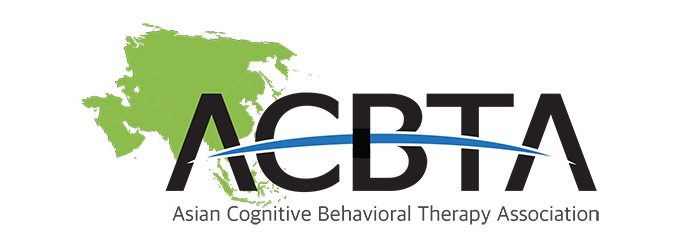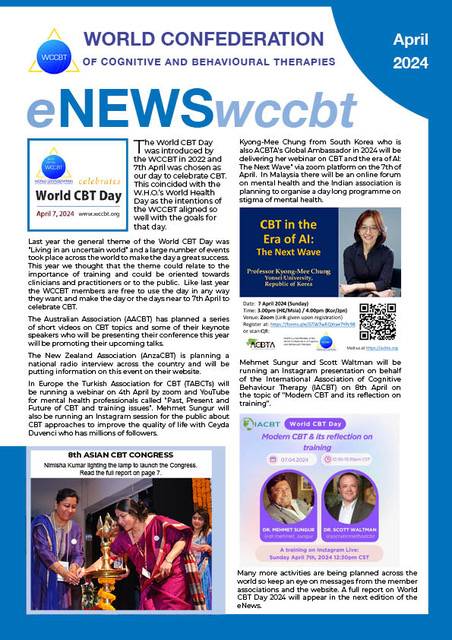WELCOME TO THE WEBSITE OF THE WORLD CONFEDERATION OF COGNITIVE AND BEHAVIOURAL THERAPIES
The World Confederation of Cognitive and Behavioural Therapies
The WCCBT is a world organisation representing CBT and board members with representatives from:
Asian Cognitive and Behaviour Therapies Association (ACBTA): acbta.org
Association for Behavioral and Cognitive Therapies (ABCT): abct.org
The Canadian Association of Cognitive and Behavioural Therapies (CACBT): cacbt.ca
Australian Association for Cognitive and Behaviour Therapy (AACBT): aacbt.org
Aotearoa New Zealand Association for Cognitive and Behavioural Therapies (): cbt.org.nz
European Association for Behavioural and Cognitive Therapies (EABCT): eabct.eu
International Association for Cognitive Behaviour Therapy (IACBT): i-acbt.com
Asociacion Latinoamericana de Analisis, Modificacion del Comportamiento y Terapia Cognitiva Conductua (ALAMOC): alamoc-web.org
Other News…
WCCBT Global Ambassadors
The WCCBT is pleased to announce the Global CBT Ambassador Programme, the Global Ambassadors and their presentations.
Click here for more information about the Global Ambassadors.
Call-To-Action to Mental Health Professionals
The psychological toll of the terrorism attack in Israel and its aftermath on the people of Israel and Gaza are tremendous and ongoing. The invasion of Ukraine continues unabated leaving enduring misery in its wake. Sudan’s civil war and the Nagorno-Karabakh conflict are other recent examples of regional conflicts that have led to immense pain and suffering. The intentional loss of life, physical injuries, kidnapping, destruction of property, relocation, separation from families, and an inability to meet basic needs for food, water, shelter, and safety substantially increase the risk for post-traumatic stress, anxiety, sadness, grief, alienation, and other psychological conditions. The significant, global increase in bigotry, intolerance, fundamentalism, and polarization in our communities are adding to the trauma experienced by innocent civilians of all cultures and identities, and consequently, further increase the risk of psychological conditions.
The WCCBT announces the following call-to-action to mental health professionals all over the world to:
- Undergo training and provide evidence-informed strategies such as Psychological First Aid to support all those undergoing trauma.
- Undergo training and formal supervision in evidence-based interventions such as Skills for Psychological Recovery for those at risk, and CBT interventions for those who develop post-traumatic stress disorder (prolonged exposure, cognitive processing therapy, and cognitive therapy), or other psychological conditions.
- Provide evidence-based treatments for psychological conditions for those at risk or those who develop PTSD or other psychological conditions.
- Understand and appreciate the profound sense of danger and invalidation many in our communities are experiencing today and provide them with empathy, validation, comfort, safety, and non-judgmental acceptance regardless of their identities or our political beliefs.
Resources relevant to work in these area can be found on the resources section of the WCCBT website
WCCBT Social Media
For more information about the activities of the WCCBT please look at our social media pages on Facebook, Instagram, X/Twitter and LinkedIn














